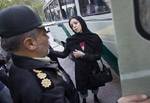 Reuters: An “unholy alliance” of Iran, Russia, the Vatican and others is threatening to derail a U.N. declaration urging an end to violence against women and girls by objecting to language on sexual, reproductive and gay rights, some U.N. diplomats said Wednesday. By Michelle Nichols
Reuters: An “unholy alliance” of Iran, Russia, the Vatican and others is threatening to derail a U.N. declaration urging an end to violence against women and girls by objecting to language on sexual, reproductive and gay rights, some U.N. diplomats said Wednesday. By Michelle Nichols
 UNITED NATIONS (Reuters) – An “unholy alliance” of Iran, Russia, the Vatican and others is threatening to derail a U.N. declaration urging an end to violence against women and girls by objecting to language on sexual, reproductive and gay rights, some U.N. diplomats said Wednesday.
UNITED NATIONS (Reuters) – An “unholy alliance” of Iran, Russia, the Vatican and others is threatening to derail a U.N. declaration urging an end to violence against women and girls by objecting to language on sexual, reproductive and gay rights, some U.N. diplomats said Wednesday.
Delegates to the United Nations Commission on the Status of Women are racing to reach a consensus deal on a final document by Friday and some diplomats say the future of the commission – a global policy-making body created in 1946 for the advancement of women – is at risk if they fail to broker a compromise.
“There’s this sort of unholy alliance … coming together to oppose language on sexual health, reproductive rights and LGBT (lesbian, gay, bisexual, transgender) rights,” one senior U.N. diplomat said. “It’s tough going, but progress is being made.”
“People recognize that if there’s a failure again this year to get an outcome document, then the whole future of the status of women commission is at risk,” he said on condition of anonymity because negotiations are still underway.
Russia, the Vatican, Iran and other conservative Muslim states including Egypt, object to references to access to emergency contraception, abortion and treatment of sexually transmitted diseases, women’s rights activists said.
Last year, disagreements over similar issues prevented the commission from agreeing on a declaration of a theme of empowering rural women. Michelle Bachelet, a former president of Chile and head of U.N. Women, which supports the commission, described last year’s impasse as “deeply regrettable” and disappointing.
Diplomats say key sticking points in this year’s draft text again revolve around sexual and reproductive rights, the inclusion of gay rights and an amendment proposed by Egypt that would allow countries to avoid implementing recommendations if they clashed with national laws, religious or cultural values.
“It’s still a big fight,” said one U.N. diplomat involved in negotiations and speaking on the condition of anonymity, adding that language on lesbian, gay, bisexual and transgender rights of women was unlikely to be included in a final document.
CULTURAL TRADITION
Egypt’s amendment to recognize states’ sovereign rights in implementing the commission’s recommendations was made on behalf of the African group of nations, although diplomats say several African countries distanced themselves from the proposal.
Some diplomats and rights activists said the Egypt amendment undermines the entire declaration by allowing states to ignore calls to end cultural and religious practices, such as female genital mutilation. Western human rights advocates say the idea of cultural tradition is often used to justify abuse of women.
“There’s also an amendment that Russia has put forward about how unilateral sanctions are promoting violence against women, which strikes us as a bit of a stretch and it’s slightly out of place,” the senior U.N. diplomat said.
The reference to unilateral sanctions appeared to be in relation to U.S. and EU sanctions against Iran and Syria.
Russia’s difficulties with language on sexual, reproductive and gay rights appears to be driven by what critics have described as a bid by President Vladimir Putin to shore up support in his country’s largely conservative society.
Putin has criticized gays for failing to help reverse a population decline. Putin has also drawn closer to the Russian Orthodox Church, one of the most influential institutions in Russia.
Jeffrey Sachs, director of the Earth Institute at Columbia University and a special adviser to U.N. Secretary-General Ban Ki-moon, also recently cited low birth rates in Russia and Iran as one possible reason for their stance on reproductive rights.
Another senior U.N. diplomat predicted that a watered down document would likely be agreed by Friday to “save face.”
Shannon Kowalski, director of advocacy and policy at the International Women’s Health Coalition, said prominent cases of violence against women, such as the shooting of a Pakistani schoolgirl and education advocate and the gang rape of a young woman in India, has mobilized women around the world.
“Countries can’t go back home and look women in the eye and tell them they could not reach agreement on ending violence against women,” said Kowalski, who has been following the negotiations. “There’s a lot of pressure here to have a strong agreement.”
(Reporting by Michelle Nichols; Editing by Stacey Joyce)


